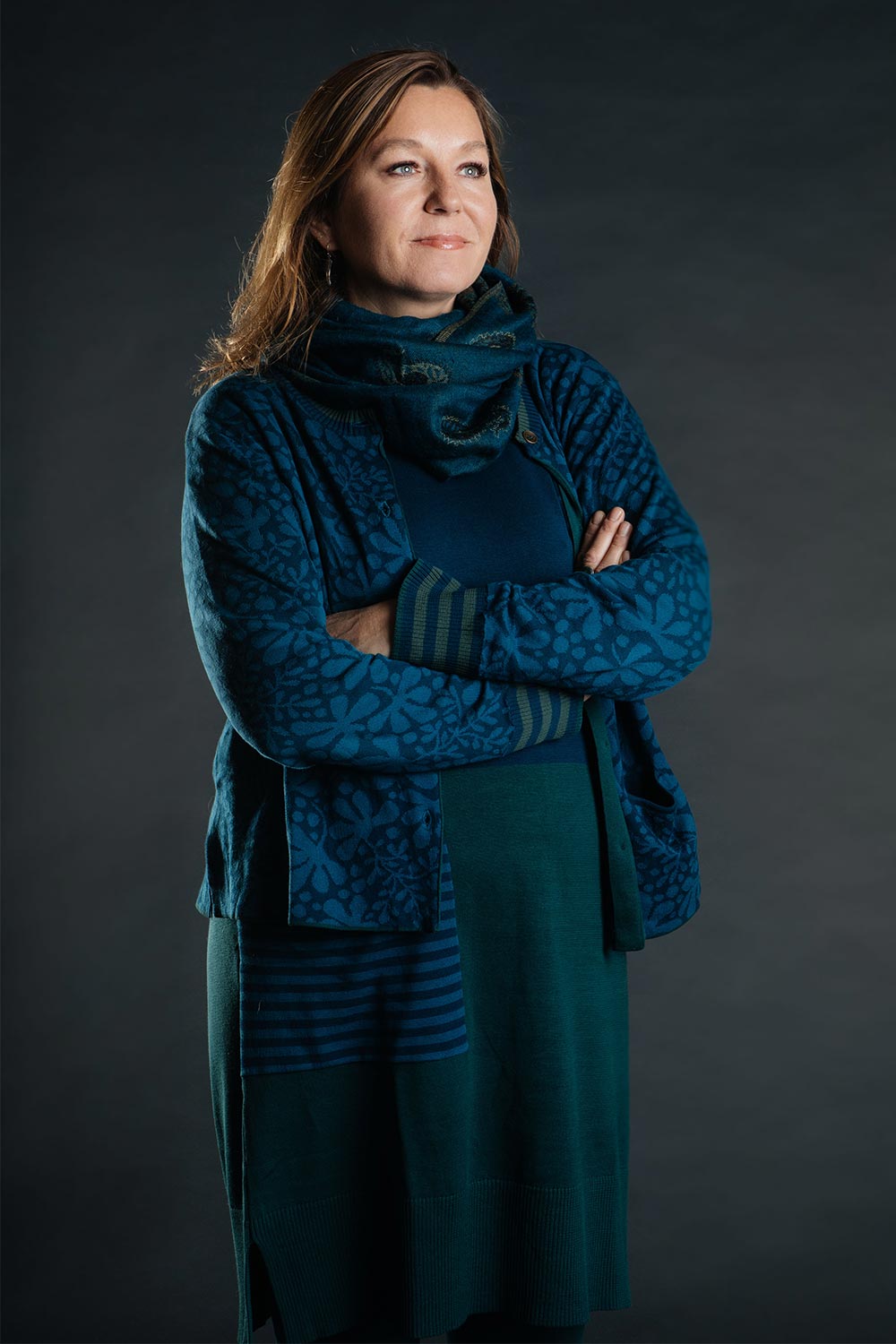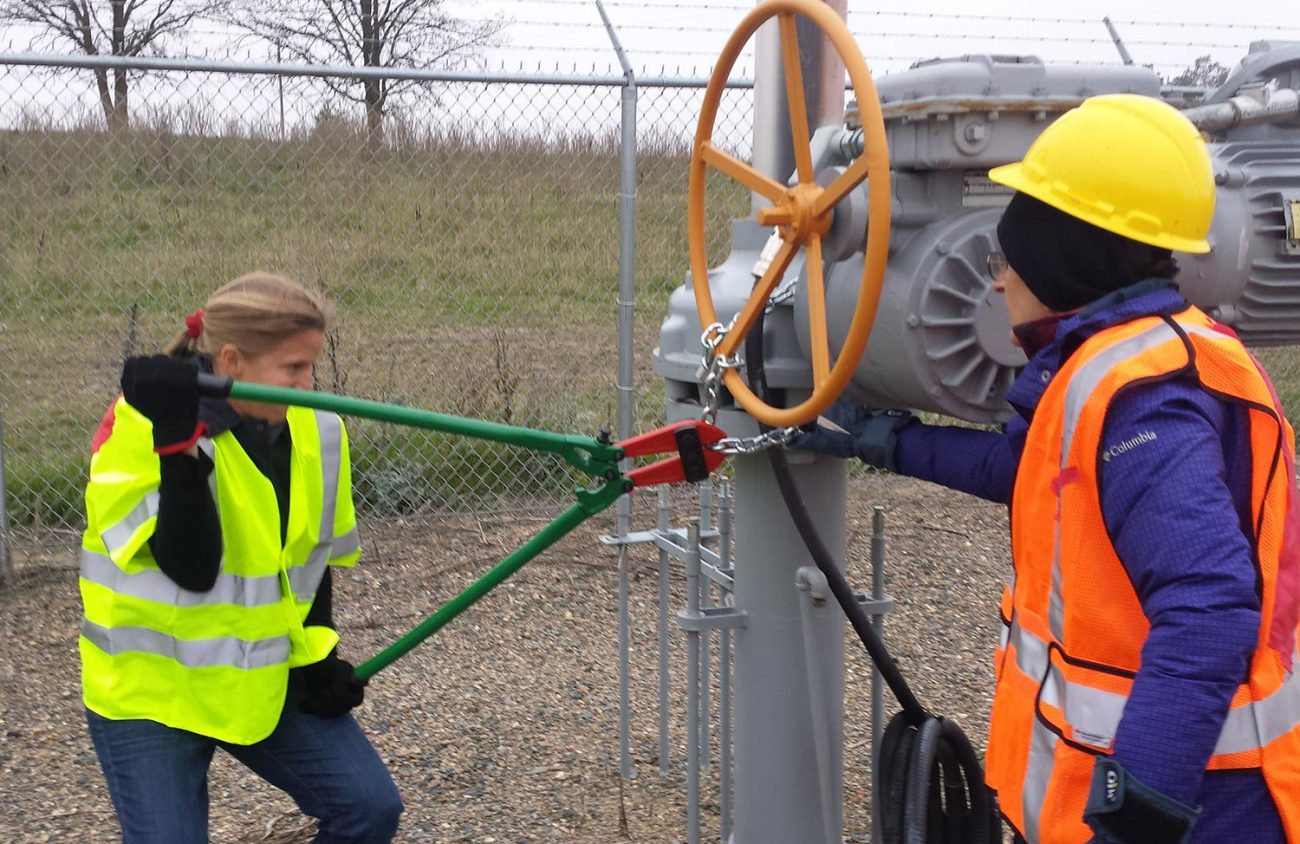It’s when you choose the lesser of two evils. It’s a time when action becomes necessary. It’s when one choice is breaking the law and the other is possible disaster.
And as the world continues to heat up from manmade climate change, environmentalists say there is no other choice but to take action.
Emily Johnston, 52, and Annette Klapstein, 66, both of Seattle, were among a group of five “Valve Turners” who turned down the flow of tar sands oil on pipelines from Canada into the United States for a short time in 2016. Johnston is a founder of 350 Seattle, which she describes as deeply engaged in climate work and mildly in civil disobedience. Klapstein says she has been an activist her whole life, including protesting Vietnam and was arrested in 2014 for blocking oil trains from entering Tesoro refinery’s unloading facility in Anacortes, Washington.
In Minnesota, the two women were charged with felony counts of criminal damage to critical public service facilities and other counts after their act of civil disobedience at an Enbridge tar sands pipeline facility.
“We don’t deny what we did at all,” Klapstein says. “What we did was a necessity.”
Johnston, Klapstein and their legal team are mounting what is called the “necessity defense.” The risk of arrest and jail time pales in comparison to the dangers of rising sea levels and increasing carbon dioxide levels. They are part of a group of people using their status as older white Americans to engage in civil disobedience and call attention to the catastrophe that is climate change.
They are far from the first to turn to the courts to battle global warming. The Our Children’s Trust youth litigation against the federal government as well as climate liability cases against Big Oil are also making their way through the courts. The Valve Turner case is the first time the necessity defense has been allowed to fight climate change before a jury.
The Valve Turners and their legal team will present the necessity defense and experts will testify about the consequences of climate change in Clearwater County, Minnesota, starting Oct. 8.
Enlarge

Photo by Todd Cooper
Defending the Climate
Klapstein and Johnston went to the Enbridge oil safety valve site on County Road 23 near Leonard, Minnesota, on Oct. 11, 2016. They entered a chain link enclosure and accessed the pipeline’s emergency shut off valve, cutting off the chains with bolt cutters.
But, they say, they didn’t do this without due caution. Support crew member Benjamin Joldersma, who also faces charges, called the pipeline company and told Enbridge they were planning to shut off the oil “in the safest possible way,” Klapstein says.
Joldersma told the company what they were doing, and said, “for the sake of climate justice and for the future of human civilization you must immediately halt the extraction and burning of Canadian tar sands.”
In fact, it was Enbridge itself that shut off the oil. Klapstein says that as they turned the “little wheel to shut off the valve, in a minute or two we saw a giant screw go down.”
Meanwhile, Steven Liptay filmed the action. His misdemeanor charges were later dropped. The activists left a small bouquet of flowers on the valve.
Similar coordinated actions were taking place at three other sites.
Leonard Higgins of Corvallis turned the shut-off valve on Enbridge’s Express Pipeline near Coal Banks Landing, Montana, and was ordered to pay $3,755 in restitution.
Ken Ward closed the valve on Kinder Morgan’s Trans Mountain pipeline near Mount Vernon, Washington, was convicted and received community service.
Michael Foster, who shut down TransCanada’s Keystone Pipeline near Walhalla, North Dakota, was convicted of felony criminal mischief and conspiracy to commit criminal mischief and a misdemeanor count of criminal trespass. He served less than six months of a one-year prison sentence.
The Valve Turners were accompanied by a support crew whose members faced charges of their own for participation in the coordinated action against climate change-inducing tar sands oil. Together, the group of nine succeeded in shutting down 15 percent of the crude oil entering the U.S. for part of a day.
The Valve Turners set out to shut down the pipelines. In a sense the case centers on just why they did it.
If you ask them, in a nutshell, it was to save the world.
The Valve Turners targeted the tar sands pipelines, their attorneys write eloquently in court documents, because burning the oil from the Canadian tar sands “would lock humanity into a cycle of dangerous warming from which it would not be able to escape.”
The lawyers in the case are Lauren Regan of Eugene-based Civil Liberties Defense Center, Minnesota-based attorney Tim Phillips and Kelsey Skaggs of the Climate Defense Project.
The tar sands themselves hold massive amounts of oil, but the CO2-intensive extraction process needed to extract the bitumen from the sands makes them even more troubling for the climate. The lawyers go on to cite the Union of Concerned Scientists, which says that each gallon of gasoline made from tar sands contributes 20 percent more CO2 emissions than average.
They also point to Dr. James Hansen’s oft-cited New York Times quote that the tar sands are “game over for the climate.”
As to climate change itself, the attorneys cite the Intergovernmental Panel on Climate Change: “By the middle of the century, more than 70 percent of summers are predicted to exceed record high temperatures across much of the continent,” and as the world warms, “Water quality is expected to decrease as a result of greater rainfall, the effects of wildfires, and changes in the chemical composition of water supplies.”
The effects on the environment also affect the economy: “Annual economic damage from flooding may increase from $2 billion to $7-19 billion by the end of the century,” to cite only a few of the IPCC’s grim facts.
Native American activist, former Oregonian and former Green Party vice-presidential candidate Winona LaDuke currently lives on the White Earth reservation in northern Minnesota and has vehemently opposed tar sands pipelines for nearly a decade. LaDuke says Enbridge’s Line 3, a pipeline that was given approval by Minnesota regulators in June, is the equivalent of 50 new coal-fired power plants coming online.
The current Line 3 is responsible for the nation’s largest inland oil spill. It ruptured near Grand Rapids in 1991 and spilled 1.7 million gallons of oil.
The Line 3 project would replace a previous, corroding Line 3 pipeline and run more than 1,000 miles from Edmonton, Alberta, to Superior, Wisconsin, over a different route from the older line. It runs through wetlands and wild rice water and across rivers and treaty land.
“It’s now a ground battle,” LaDuke says of the fight against oil pipelines, adding that the Water Protectors are preparing for direct action. The Water Protectors became known during their protracted battle against the Dakota Access Pipeline at Standing Rock.
“It is absolutely true that Annette [Klapstein] and other concerned citizens are doing this out of absolutely need,” she says. “The system has been hijacked by the oil companies. People are trying to do whatever they can to protect our planet, our Earth, our water.”
Enlarge

Photo by Todd Cooper
Absolute Necessity
The attorneys point out in their filings that Minnesota common law recognizes the necessity defense, which the Minnesota Court of Appeals defined in a previous case: “A necessity defense defeats a criminal charge if the harm that would have resulted from compliance with the law would have significantly exceeded the harm actually resulting from the defendant’s breach of the law.”
Working from her Eugene office, Regan tells EW that the necessity defense will allow the climate activists to demonstrate that, first, the harm to the climate and the planet significantly exceeds the harm actually caused by the law-breaking of the valve turning, a nonviolent direct action.
Second, there are no reasonable legal alternatives to breaking the law at this point when it comes to climate change.
Third, the defendants were in danger of imminent physical harm from the effects of such as sea-level rise and wildfires.
And finally, they will show there was a “direct causal connection between breaking the law and preventing the harm.”
Longtime climate activist and 350.org founder Bill McKibbin, who is lined up to testify at the trial in rural Minnesota, tells EW via email that “Civil disobedience is a way to underline the moral urgency of a situation; it helps people understand just how important it is. And climate change is a timed test — since we have to act quickly. That adds to the imperative.”
When it comes to stopping climate change, “no action by itself can possibly get us there,” McKibben says. “It takes a wide movement pursuing many possibilities — we march, we testify, we lobby, we vote and sometimes we go to jail.”
Climate in the Courts
“Climate change cases have been filed since the late 1980s,” explains Andrea Rogers, senior staff attorney with Our Children’s Trust. Rogers says those cases were challenges to “final agency actions” and primarily challenged projects that caused greenhouse gas emissions. They didn’t get to the full scope of the problem, she says.
Moreover, despite the lawsuits, permits were still issued, and fossil fuel projects and pipelines are still happening.
The 21 young plaintiffs of the Our Children’s Trust lawsuit, Juliana v. United States, filed a constitutional case based on the public trust doctrine, arguing that if the government is causing harm to the climate system, it needs to be enjoined to stop that harm. The youths, now ages 10 to 21, filed against the federal government in the U.S. District Court for the District of Oregon in 2015.
The case has slowly made its way through the court system, with the federal government — and at one point the fossil fuel industry — fighting them tooth-and-nail along the way.
The case alleges that the government violated the youths’ constitutional rights by contributing to climate change. It is set to go to trial Oct. 29 at the Wayne Morse Federal Courthouse in Eugene.
Rogers says the case was framed the way it was because climate change is not a problem that legislatures are willing or able to solve.
“These kids are experiencing severe climate impacts, and the government has done nothing to protect them,” Rogers says, “so it rises to the level of a constitutional violation, and it’s up to the court to step in.”
To those who have called the youth lawsuit a “publicity stunt” that won’t stop climate change, Rogers points out that the case has been litigated during the past three years in the Ninth Circuit Court and in the Supreme Court, adding, “The arguments we are making are well founded in legal principles. We are proceeding to the trial. We left the publicity behind.”
A key legal principle to which Rogers refers is the public trust doctrine.
Essentially, the public trust doctrine limits the way the government transfers or develops natural resources that it holds in trust for the public, including for future generations. It’s implicit that the people wouldn’t give the government the power to destroy resources such as the climate.
Another set of climate cases is coming at global warming from a different angle.
In July, Rhode Island filed a lawsuit against “21 national and international oil companies, including ExxonMobil, BP, Chevron, Shell and others, for knowingly contributing to climate change and causing catastrophic consequences to Rhode Island, our economy, our communities, our residents, and our eco-systems,” according to remarks by that state’s attorney general, Peter Kilmartin.
The suit joins 12 cities and counties from the city of Baltimore to Santa Cruz County that are trying to tackle climate change by holding fossil fuel companies accountable.
Rhode Island is the first state to sue oil companies over the effects of climate change.
Law firm Sher Edling is outside counsel in eight of the cases, including the Rhode Island lawsuit. According to a press release from the law firm, unlike several climate cases filed by New York City, San Francisco and Oakland, which have been dismissed, the Sher Edling cases address not just public nuisance claims, but also “product liability and negligence to failure to warn and violations of consumer protection laws.”
Rhode Island’s complaint, filed in Providence County Superior Court, says the “defendants have known for nearly 50 years that greenhouse gas pollution from their fossil fuel products has a significant impact on the Earth’s climate and sea levels.”
It goes on to say that, instead of trying to reduce the burning of fossil fuels, the companies “concealed the dangers, sought to undermine public support for greenhouse gas regulation, and engaged in massive campaigns to promote the ever-increasing use of their products at ever greater volumes.”
The suit seeks damages for the costs associated with protecting the small coastal state of Rhode Island from rising seas and severe weather.
“We have too much to lose if we do nothing,” the attorney general said. “And they are responsible.”
Unlike the Our Children’s Trust case, these cases are filed in state court, not federal, and they are currently engaged in jurisdictional fights to stay in state court.
Time to Act
“Somber and worried, but also serene.”
That is how Emily Johnston said she was feeling before entering the enclosure to shut off the Enbridge tar sands oil valve and risk arrest. Talking to EW now, she points to the storms worsened by climate change, such as the hurricane that hit Puerto Rico, killing almost 3,000 people, according to a study by George Washington University.
“For sure, I had some worry,” Johnston says of the valve turning. “Taking the risk of spending years in jail is not something I welcomed at all. We were totally prepared to face the consequences.”
Annette Klapstein adds, “I agree, and I personally feel very strongly it’s our job as elders to step up and protect our children and grandchildren and future generations” from the effects of climate change.
She continues, “It is totally criminal, a crime against humanity and all life by the fossil fuel industry, and I begrudge every life they have taken and will take.”
Klapstein is a “Raging Granny,” a member of a social justice organization made up of women old enough to be grandmothers who are known for their activism and songs. “We are in a key window that is rapidly closing, where we can still stave off runaway climate change,” she says. “This is the time to step up.”
Specifically, she says, “For old white people like myself, this is our duty. We are in the best position because of our privilege.” She points out that the police are “unlikely to shoot us, unlike our young people of color activist friends.”
Klapstein is retired from her work as an attorney for the Puyallup Tribe. “While I don’t relish the idea of prison, I’m not going back to work, no one is depending on me. I’m privileged in so many ways.”
“What better thing to do with your retirement?” she asks.
Speaking of the upcoming case, as well as lawsuits such as the Our Children’s Trust case and the climate liability cases, Johnston says, “They are super important because, there again it’s all about changing the narrative. Cities and counties and jurisdictions are incurring tremendous bills. Those bills are directly the result of the of the fossil fuel industry.”
Johnston says, “It’s time to hold people accountable to the level of evil fossil fuel companies have engaged in. We actually have an opportunity to stop devastation that nobody will ever have again.”
The Valve Turners case goes to trial Oct. 8 in Minnesota; find our more at shutitdown.today. Our Children’s Trust’s suit, ourchildrenstrust.org, begins Oct. 29 at the Wayne Morse Federal Courthouse in Eugene. The climate liability cases are making their way through the courts. More on the Rhode Island case at sheredling.com/climate-change. Winona LaDuke gives a free lecture at Willamette University 7 pm Monday, Oct. 22, at Hudson Hall, Mary Stuart Rogers Music Center in Salem.
Update Oct. 9
District Court Judge Robert Tiffany acquitted defendants of all charges in the Valve Turners case of Annette Klapstein and Emily Johnston and support person Ben Joldersma. Tiffany ruled that the prosecution failed to demonstrate any evidence of damage to two Enbridge pipelines.
This is after last week’s decision in which, “the court forbade all expert testimony related to climate change and civil disobedience, while still allowing safety testimony, and possibly testimony to direct, non-climate impacts of tar sands extraction and pipeline,” according to a press release from the Valve Turners’ defense team.
